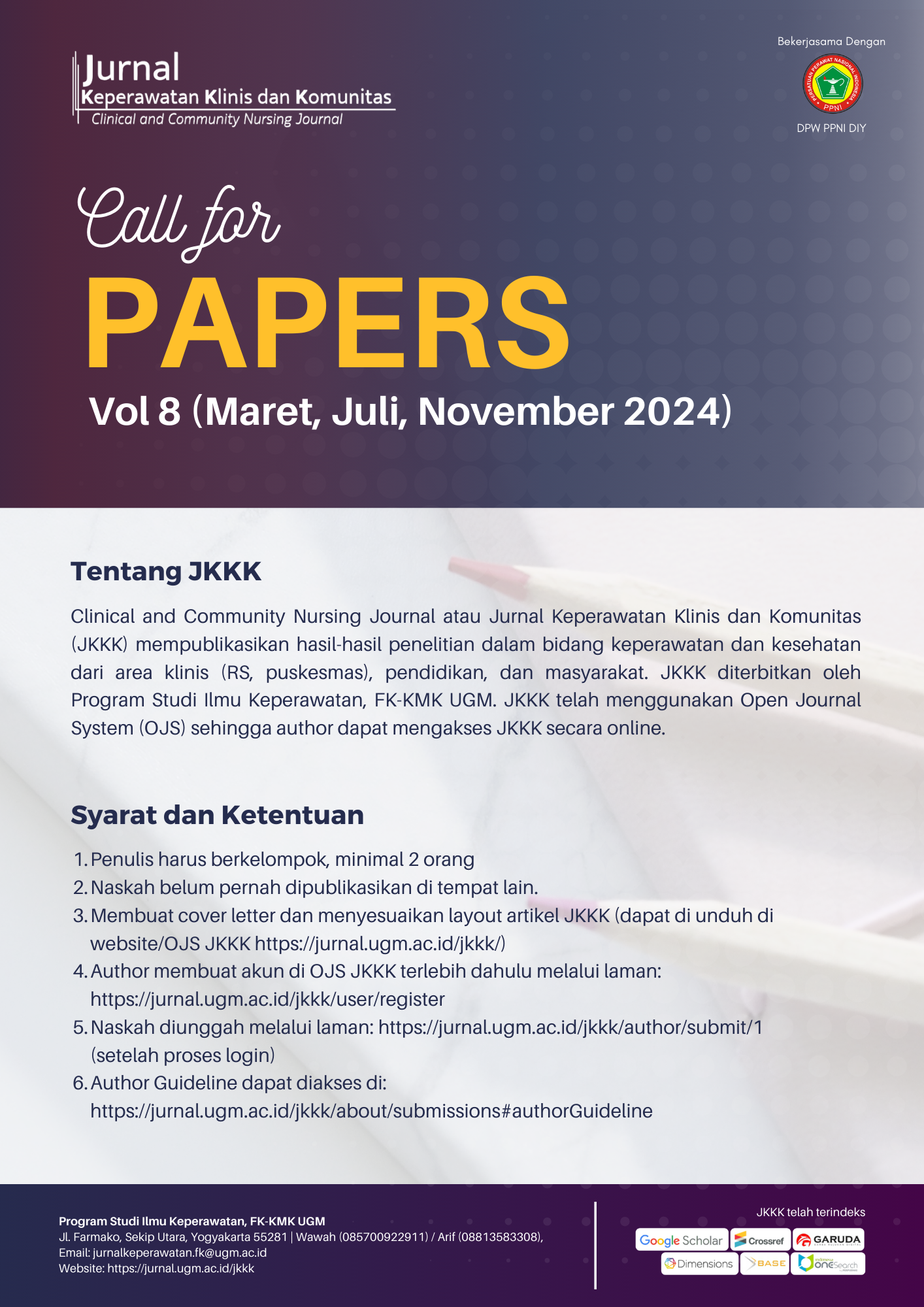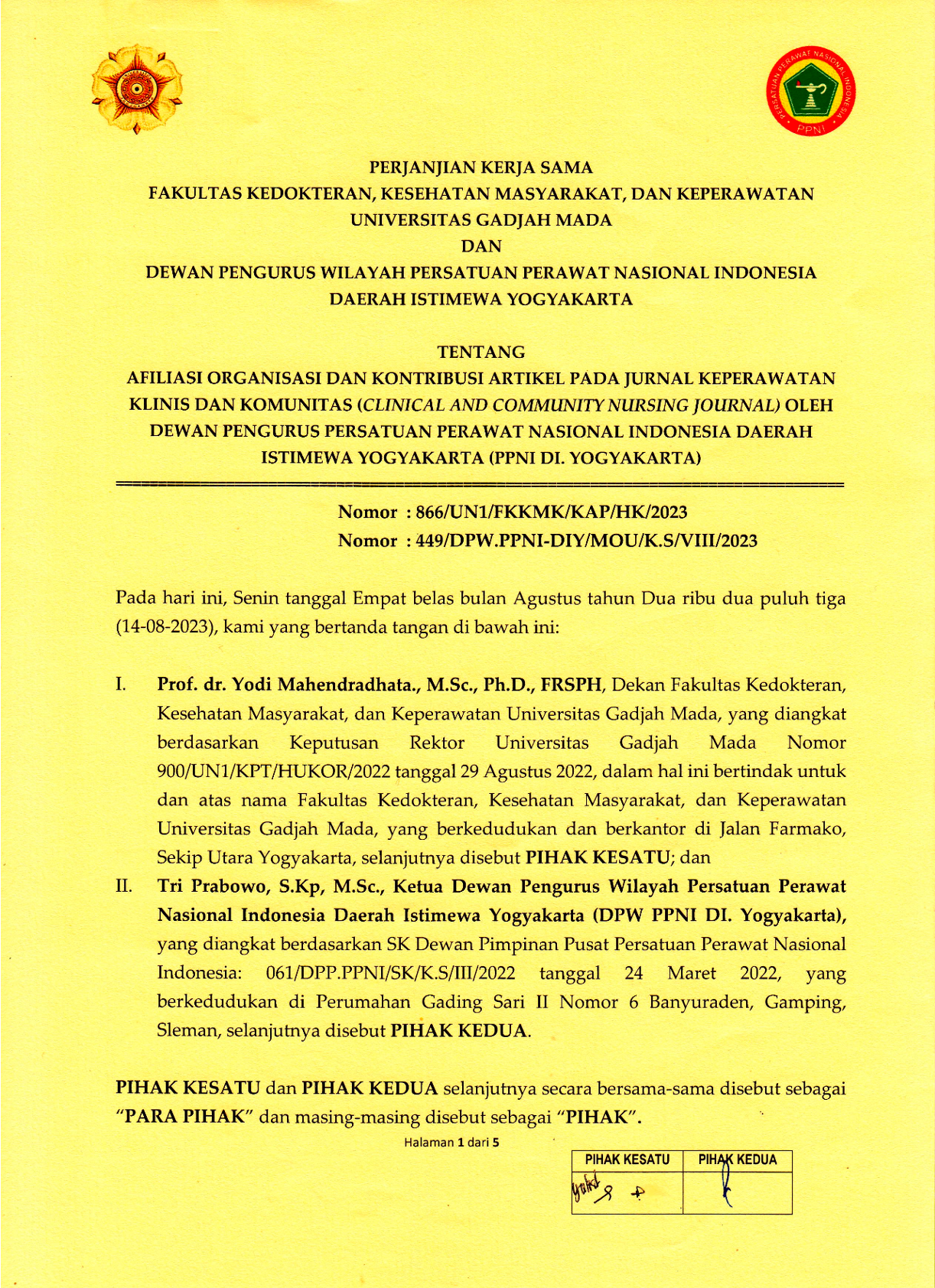Analisis Asuhan Keperawatan pada Pasien dengan Gagal Ginjal Kronik di ICU RSUP Dr. Sardjito dengan Pendekatan NANDA NOC NIC: Studi Kasus
Ni Luh Seri Astuti(1*), Sri Setiyarini(2)
(1) S1 Keperawatan Ners, STIKES Advaita Medika Tabanan
(2) Departemen Keperawatan Dasar dan Emergensi, Fakultas Kedokyeran Kesehatan Masyarakat dan Keperawatan, Universitas Gadjah Mada
(*) Corresponding Author
Abstract
Background: Dialysis is a method of maintaining body function in patients with Chronic Kidney Disease (CKD). Dialysis therapy causes several complications. Therefore, it needs special approach to ensure that the nursing process of CKD patients who undergoing hemodialysis goes well.
Objective: To analyze a CKD case using North American Nursing Diagnosis Association-Nursing Outcome Classification-Nursing Intervention Classification (NANDA-NOC-NIC) approach.
Case report: Due to dialysate inability to draw fluids, patient’s main complaint was whole-body swelling and short of breath feeling after light activity. The patient had acute breath shortness with a respiratory rate of 34 times per minute and an oxygen saturation of 80%. CPR was provided to the patient for 30 minutes, and OPA was installed. As a result of the activity, the patient's oxygen saturation rose between 85 to 90% and developed ROSC.
Result: The nursing diagnoses indicated that there was excessive fluid volume and exercise intolerance. The NOC NIC criteria were used to guide the intervention, which comprised fluid management, fluid monitoring, and exercise therapy.
Conclusion: There are two nursing problems in this study case, based on NANDA-NOC-NIC approach, ie.: excessive fluid volume and activity intolerance.
ABSTRAK
Latar belakang: Terapi dialisis merupakan cara untuk mempertahankan fungsi tubuh pada kondisi Gagal Ginjal Kronik (GGK). Terapi dialisis juga menyebabkan beberapa komplikasi, sehingga memerlukan pendekatan khusus untuk menangani, agar proses keperawatan pasien GGK yang menjalani hemodialisis berjalan dengan baik.
Tujuan: menganalisis kasus gagal ginjal kronik melalui pendekatan North American Nursing Diagnosis Association-Nursing Outcome Classification-Nursing Intervention Classification (NANDA-NOC-NIC).
Studi kasus: Keluhan utama bengkak seluruh tubuh dan merasa sesak nafas setelah aktivitas ringan akibat dialisat gagal menarik cairan. Pasien mengalami sesak nafas berat, RR 34x/menit, saturasi oksigen 80%. Pasien diberikan RJP selama 30 menit serta pemasangan OPA. Hasil tindakan yakni saturasi oksigen mencapai 85% hingga 90%, kemudian pasien mengalami ROSC.
Hasil: Diagnosis keperawatan yang ditegakkan adalah kelebihan volume cairan dan intoleransi aktivitas. Intervensi yang diberikan pada diagnosis berdasarkan kriteria NOC NIC meliputi manajemen dan monitoring cairan, serta terapi aktivitas.
Simpulan: Ada dua masalah keperawatan dalam studi kasus ini, berdasarkan pendekatan NANDA-NOC-NIC, yaitu kelebihan volume cairan dan intoleransi aktivitas.
Keywords
Full Text:
PDFReferences
- Kallenbach ZJ. Review of Hemodialysis for Nurses and Dialysis Personnel. In: 7th Ed. St. Louis: Elsevier Mosby; 2005.
- Smeltzer SC, Bare BG, Hinkle JL, Cheever KH. Brunner and Suddarth’s Textbook of Medical Surgical Nursing (12th ed.). 2010; 12(14).
- Riset Kesehatan Dasar. Badan Penelitian dan Pengembangan Kesehatan Kementerian Kesehatan RI. 2013; 7(803-9).
- Arifa SI, Azam M, Handayani OWK. Faktor yang Berhubungan dengan Kejadian Penyakit Ginjal Kronik pada Penderita Hipertensi di Indonesia. Media Kesehatan Masyarakat Indonesia. 2017; 13(4): 319. https://doi.org/10.30597/mkmi.v13i4.3155
- Price SA, Wilson L. Patofisiologi: Konsep Klinis Proses-proses Penyakit. 6th ed. Jakarta: EGC; 2006.
- Finnegan-John J, Thomas VJ. The Psychosocial Experience of Patients with End-Stage Renal Disease and Its Impact on Quality of Life: Findings from A Needs Assessment to Shape a Service. ISRN Nephrol. 2013; 1–8. https://doi.org/10.5402/2013/308986
- Park MS, Choi SR, Song YS, Yoon SY, Lee SY, Han DS. New Insight of Amino Acid-based Dialysis Solutions. Kidney Int [Internet]. 2006; 70(SUPPL. 103): S110–4. http://dx.doi.org/10.1038/sj.ki.5001925.
- Jesus NM, Souza GF de, Mendes-Rodrigues C, Almeida Neto OP de, Rodrigues DDM, Cunha CM. Quality of Life of Individuals with Chronic Kidney Disease on Dialysis. J Bras Nefrol. 2019; 41(3): 364–74. https://doi.org/10.1590/2175-8239-jbn-2018-0152
- Herdman TH, Kamitsuru S. NANDA International Nursing Diagnosis Definition and Classification 2018-2020. 11th ed. Jakarta: EGC. 2018.
- Paiva MDGMN, Tinôco JDS, Fernandes MIDCD, Dantas JR, Nogueira ILA, Medeiros ABA, Lopes MVO, Lira ALBC. Ineffective Health Management in Hemodialysis Patients: Diagnostic Accuracy Study. Clin Nurs Res. 2019; 28(5): 602–14. https://doi.org/10.1177/1054773817754021
- Fernandes MI, Bispo Mde M, Leite ÉM, Lopes MV, da Silva VM, Lira AL. Diagnostic Accuracy of The Defining Characteristics of The Excessive Fluid Volume Diagnosis in Hemodialysis Patients. Rev Lat Am Enfermagem. 2015; 23(6): 1057–64. https://doi.org/10.1590/0104-1169.0380.2649
- Smeltzer B, Hincle B, Cheever K. Textbook of Medical Surgical Nursing: Brunner & Suddart. Eleventh. A Wolter Kluwer Business. 2008.
- Frazão CMFQ, Medeiros ABA, Silva FBBL, Sá JD, Lira ALBC. Nursing Diagnoses in Chronic Renal Failure Patients on Hemodialysis. Acta Paul Enferm. 2014; 27(1): 40–3. http://dx.doi.org/10.1590/1982-0194201400009
- Ravi V, Iskander F, Saini A, Brecklin C, Doukky R. Clinical Predictors and Outcomes of Patients with Pericardial Effusion in Chronic Kidney Disease. Clin Cardiol. 2018; 41(5): 660–5. https://doi.org/10.1002%2Fclc.22946
- Rampengan SH. Edema Paru Kardiogenik Akut. J Biomedik. 2014; 6(3): 149–56. http://dx.doi.org/10.35790/
6.3.2014.6320 - Nurjannah I, Mailani F. The Most Frequent Diagnosis on Patients Undergoing Hemodialysis. Int J Res Med Sci. 2016; 4(10): 4453–7. https://dx.doi.org/10.18203/2320-6012.ijrms20163310
- Rosenthal R. Parametric Measures of Effect Size. In H. Cooper & L. V. Hedges. The Handbook. New York: Russellsage Foundation; 1994. 231–244 p.
Article Metrics
Refbacks
- There are currently no refbacks.
Copyright (c) 2022 Ni Luh Seri Astuti, Sri Setiyarini

Jurnal Keperawatan Klinis dan Komunitas (Clinical and Community Nursing Journal)
collaborates with DPW PPNI DIY
![]()
Jurnal Keperawatan Klinis dan Komunitas (Clinical and Community Nursing Journal) is licensed under a Creative Commons Attribution-ShareAlike 4.0 International License.




